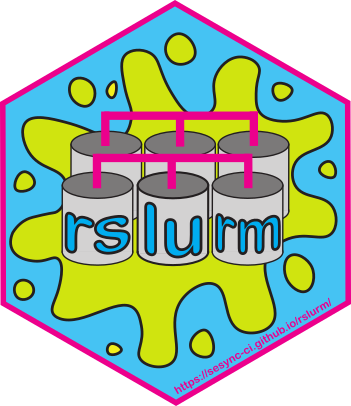
The hardware and bandwidth for this mirror is donated by METANET, the Webhosting and Full Service-Cloud Provider.
If you wish to report a bug, or if you are interested in having us mirror your free-software or open-source project, please feel free to contact us at mirror[@]metanet.ch.

[R build
status]https://github.com/earthlab/rslurm/workflows/R-CMD-check/badge.svg)
Development of this R package was supported by the National Socio-Environmental Synthesis Center (SESYNC) under funding received from the National Science Foundation grants DBI-1052875 and DBI-1639145.
The package was developed by Philippe Marchand and Ian Carroll, with Mike Smorul and Rachael Blake contributing. Erick Verleye is the current maintainer.
As of January 2023 the University of Colorado Boulder’s Earth Lab adopted rslurm and is responsible for all future maintenance.
You can install the released version of rslurm from CRAN with:
install.packages("rslurm")And the development version from GitHub with:
# install.packages("devtools")
devtools::install_github("earthlab/rslurm")Package documentation is accessible from the R console through
package?rslurm and online.
Note that job submission is only possible on a system with access to
a Slurm workload manager (i.e. a system where the command line utilities
squeue or sinfo return information from a
Slurm head node).
To illustrate a typical rslurm workflow, we use a simple function that takes a mean and standard deviation as parameters, generates a million normal deviates and returns the sample mean and standard deviation.
test_func <- function(par_mu, par_sd) {
samp <- rnorm(10^6, par_mu, par_sd)
c(s_mu = mean(samp), s_sd = sd(samp))
}We then create a parameter data frame where each row is a parameter set and each column matches an argument of the function.
pars <- data.frame(par_mu = 1:10,
par_sd = seq(0.1, 1, length.out = 10))We can now pass that function and the parameters data frame to
slurm_apply, specifying the number of cluster nodes to use
and the number of CPUs per node.
library(rslurm)
sjob <- slurm_apply(test_func, pars, jobname = 'test_apply',
nodes = 2, cpus_per_node = 2, submit = FALSE)The output of slurm_apply is a slurm_job
object that stores a few pieces of information (job name, job ID, and
the number of nodes) needed to retrieve the job’s output.
See Get started for more information.
These binaries (installable software) and packages are in development.
They may not be fully stable and should be used with caution. We make no claims about them.